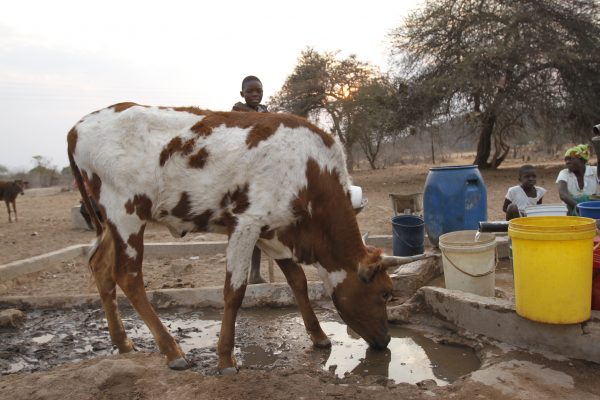
THE condition of livestock in Beitbridge district is fast deteriorating into a disaster, with reports of numerous cattle stuck in mud at various watering points in the vast district.
BY OWN CORRESPONDENT
District veterinary officer at Beitbridge, Mike Nare, confirmed the most vulnerable were pregnant cows now dying while giving birth.
“Pregnant cows are most affected and have a condition called dystochia, which is a difficulty in giving birth due to weakness,” he said in an interview with the NewsDay Weekender yesterday.
“Cases of prolapse, where reproductive organs of cows like the womb come out when it is giving birth, have increased and are a cause for concern.”
The situation in both Beitbridge East and West was similar and other smaller stocks and donkeys are affected, he said.
Animal vulnerability to other diseases has increased and noticeable are tick-related infections because animals are to weak to reach dip tanks.
“Animals have vitamin mineral deficiency and are, as a result, weak. They cannot make it to dip tanks,” Nare said.
- Chamisa under fire over US$120K donation
- Mavhunga puts DeMbare into Chibuku quarterfinals
- Pension funds bet on Cabora Bassa oilfields
- Councils defy govt fire tender directive
Keep Reading
Beitbridge, whose mainstay is beef, has a head of just under 100 000 cattle, but the figure was under threat from effects of drought. To date, the district has not received a drop of rains.
Nare said donkeys were beginning to show signs of stress, while goats, known to be resilient and can feed on anything, are holding on.
Albert Ndlovu, a resettled farmer from Zhovhe Dam 70km west of the border town, said several cattle were stuck in the mud.
“They are too weak to pull out and we are going to lose a significant head,” he said. “The government is only looking at crop farmers getting assistance under the recently launched Command Agriculture, while turning a blind eye to us the beef producers.”
Similar situations have been reported from Tongwe Dam and villagers are setting up rescue teams but oftenly fail to get suplementary food for rescued animals fast outnumbering manpower.
Zimbabwe, until a ban on its beef exports due to an outbreak of foot and mouth disease, earned substantial amounts from the beef industry, but is currently getting little or no attention from government.
Despite recurrent droughts that have seen the national head diminishing, the government does not have programmes to combat effects of drought in livestock.
Ndlovu, who comes from the wildlife-rich Beitbridge West, said wild animals were emaciated and badly affected by the current drought.











